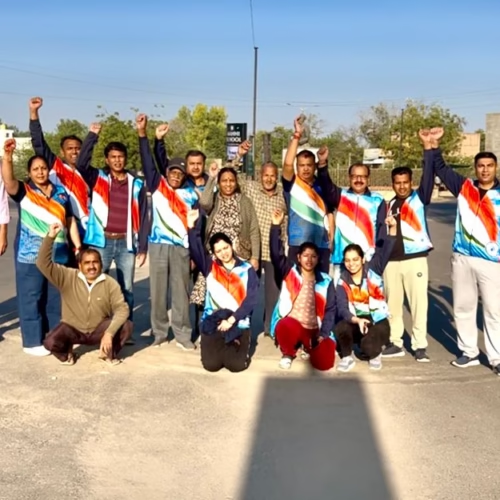By Defence Journalist Sahil
Alert: Pakistani Intelligence Using Indian Numbers to Target Journalists and Civilians Amid Operation Sindoor
In a concerning development amidst heightened security conditions and strategic military operations under Operation Sindoor, Indian intelligence agencies have uncovered a sophisticated and dangerous attempt by Pakistan’s Inter-Services Intelligence (ISI) to infiltrate the Indian information ecosystem. The revelation has sent shockwaves across the country’s defence and media circles.
According to official sources, a Pakistani Intelligence Operative (PIO) is using the Indian mobile number 73*******2 to impersonate Indian defence officials. The objective is to reach out to Indian journalists, security analysts, and even unsuspecting civilians, seeking sensitive and real-time information about troop movements, air operation results, strike locations, and other classified data related to Operation Sindoor—India’s high-level military response to recent cross-border provocations and a suspected nuclear incident in Pakistan’s Kirana Hills.
Modus Operandi: Sophisticated, Deceptive, and Dangerous
The PIO pretends to be a high-ranking officer from Army Headquarters or Air Force Intelligence. The call usually begins with polite introductions in fluent Hindi or English, followed by a seemingly official request for inputs on recent developments or confirmation of military actions reported in the media. Some calls are followed up with WhatsApp messages containing fake digital ID cards, forged documents, and impersonated credentials.
Sources within Indian security agencies confirm that journalists covering defence affairs, especially those active on digital platforms like Twitter (X), YouTube, and regional news channels, are being targeted. Several calls were reported in Delhi, Jaipur, Lucknow, and Srinagar.
Officials have traced the number back to VoIP platforms routed through proxy servers, making it appear as an Indian number when it is operated from Pakistani territory.
Counterintelligence Alert: Government Issues Advisory
In response to these attempts, Indian defence and cyber intelligence agencies have issued an internal red alert, warning all media professionals, strategic analysts, and field correspondents to be vigilant. All defence Public Relations Officers (PROs) across commands have also been instructed to monitor any abnormal interaction requests.
An official advisory from the Ministry of Home Affairs is likely to be released soon. The Defence Intelligence Agency (DIA) is working with the Telecom Department to block the number and trace other associated virtual connections.
Operation Sindoor: Why Pakistan is Desperate for Intel
India’s Operation Sindoor, launched in April 2025, has rattled Pakistan’s internal defence mechanisms. The operation—reportedly involving air strikes, special ops near LoC, and suspected cyber-electronic warfare—has remained strategically opaque. This ambiguity has frustrated Pakistani military leadership and intelligence, prompting desperate moves to harvest open-source intelligence (OSINT) from Indian journalists, influencers, and experts.
There are also concerns that Pakistan’s nuclear assets were compromised or destabilized due to a recent radiation incident in Kirana Hills, where US nuclear surveillance aircraft like the B-350 AMS were spotted. This suggests international involvement or observation, further complicating the narrative and increasing ISI’s urgency to gather intel.
Journalists & Civilians: How to Stay Safe
Authorities are urging civilians, especially journalists covering defence, foreign policy, and internal security, to follow these precautions:
- Do not answer unknown WhatsApp or VoIP calls claiming to be defence officials.
- Verify identity through official MoD or PRO channels.
- Immediately report suspicious numbers to local cyber police and MoD.
- Avoid sharing sensitive analysis or real-time updates without confirmation.
- Journalists should alert their editorial teams upon receiving any suspicious outreach.
Strategic Concern: Digital Espionage on the Rise
Cyber warfare and digital espionage are the new frontlines in modern warfare. As seen in this case, ISI is evolving its methods—from infiltrating social media forums to posing as legitimate Indian defence contacts to mislead public discourse or extract information.
Experts argue that India must now treat cyber infiltration as seriously as border incursions, especially during active operations like Sindoor. As military operations grow more strategic, the information ecosystem will be the first line of defence—and also the first line of attack.
Conclusion
The exposure of this espionage tactic is a timely reminder of the multi-dimensional warfare India faces today—from physical to digital, from borders to smartphones. Every journalist, analyst, and citizen must stay alert, cautious, and patriotic in how they consume and share defence-related information.
The enemy may be watching and listening.
ऑपरेशन सिंदूर के दौरान पाकिस्तानी खुफिया एजेंसी भारतीय नंबर से पत्रकारों और नागरिकों को बना रही निशाना
भारत की खुफिया एजेंसियों ने ऑपरेशन सिंदूर के दौरान एक गंभीर साइबर जासूसी प्रयास का भंडाफोड़ किया है। जानकारी के अनुसार, पाकिस्तानी खुफिया एजेंसी ISI के एक ऑपरेटिव द्वारा भारतीय मोबाइल नंबर 73*******2 का इस्तेमाल किया जा रहा है, जो खुद को भारतीय सेना या वायुसेना का अधिकारी बताकर भारतीय पत्रकारों और नागरिकों से संपर्क कर रहा है।
इसका उद्देश्य है ऑपरेशन सिंदूर से संबंधित संवेदनशील सूचनाएं हासिल करना — जैसे कि सेना की मूवमेंट, एयर स्ट्राइक की जानकारी, और परमाणु घटनाक्रम से जुड़ी जानकारियाँ।
कैसे हो रहा है जासूसी प्रयास?
- कॉल्स में खुद को रक्षा विभाग का अधिकारी बताकर भरोसा जीतने की कोशिश होती है।
- व्हाट्सएप के जरिए फर्जी दस्तावेज़ और आईडी भेजे जाते हैं।
- पत्रकारों और रक्षा विशेषज्ञों को लक्ष्य बनाया जा रहा है, विशेषकर वे जो डिजिटल मीडिया में सक्रिय हैं।
सरकार का अलर्ट और चेतावनी
- रक्षा मंत्रालय और साइबर एजेंसियों ने सभी रक्षा संवाददाताओं और विश्लेषकों को सतर्क रहने को कहा है।
- PRO अधिकारियों को निर्देशित किया गया है कि किसी भी असामान्य संपर्क को गंभीरता से लें।
- गृह मंत्रालय जल्द ही इस विषय में सार्वजनिक चेतावनी जारी कर सकता है।
पाकिस्तानी हताशा की वजह: ऑपरेशन सिंदूर की गोपनीयता
ऑपरेशन सिंदूर ने पाकिस्तान की सैन्य और परमाणु रणनीति को झकझोर दिया है। किराना हिल्स में हुए रेडिएशन लीक और अमेरिकी B-350 विमान की गतिविधियों ने पाकिस्तान की ISI को बौखला दिया है। इसी के चलते वह अब भारतीय नागरिकों और पत्रकारों से जानकारी हासिल करने के लिए धोखाधड़ी के प्रयास कर रही है।
सावधान रहने के लिए सुझाव:
- अनजान नंबर से आए कॉल को न उठाएं।
- कोई भी जानकारी साझा करने से पहले सरकारी स्रोत से पुष्टि करें।
- संदिग्ध नंबर की शिकायत नजदीकी साइबर पुलिस स्टेशन में करें।
- रक्षा रिपोर्टिंग कर रहे पत्रकारों को विशेष सतर्कता बरतने की सलाह दी गई है।
निष्कर्ष: नया युद्धक्षेत्र है डिजिटल स्पेस
इस घटना से स्पष्ट है कि युद्ध अब सिर्फ बॉर्डर पर नहीं, मोबाइल फोन और इंटरनेट के ज़रिए भी लड़ा जा रहा है। हर भारतीय को अब सूचना का योद्धा बनना होगा — जागरूक, सतर्क और राष्ट्रभक्त।












Add Comment